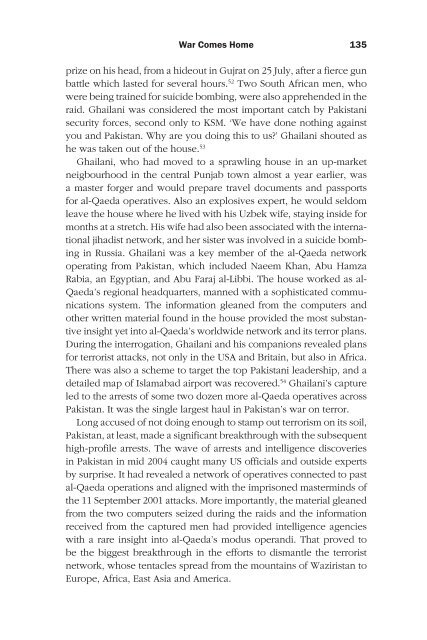Frontline Pakistan : The Struggle With Militant Islam - Arz-e-Pak
Frontline Pakistan : The Struggle With Militant Islam - Arz-e-Pak
Frontline Pakistan : The Struggle With Militant Islam - Arz-e-Pak
Create successful ePaper yourself
Turn your PDF publications into a flip-book with our unique Google optimized e-Paper software.
War Comes Home<br />
prize on his head, from a hideout in Gujrat on 25 July, after a fierce gun<br />
battle which lasted for several hours. 52 Two South African men, who<br />
were being trained for suicide bombing, were also apprehended in the<br />
raid. Ghailani was considered the most important catch by <strong><strong>Pak</strong>istan</strong>i<br />
security forces, second only to KSM. ‘We have done nothing against<br />
you and <strong><strong>Pak</strong>istan</strong>. Why are you doing this to us?’ Ghailani shouted as<br />
he was taken out of the house. 53<br />
Ghailani, who had moved to a sprawling house in an up-market<br />
neigbourhood in the central Punjab town almost a year earlier, was<br />
a master forger and would prepare travel documents and passports<br />
for al-Qaeda operatives. Also an explosives expert, he would seldom<br />
leave the house where he lived with his Uzbek wife, staying inside for<br />
months at a stretch. His wife had also been associated with the international<br />
jihadist network, and her sister was involved in a suicide bombing<br />
in Russia. Ghailani was a key member of the al-Qaeda network<br />
operating from <strong><strong>Pak</strong>istan</strong>, which included Naeem Khan, Abu Hamza<br />
Rabia, an Egyptian, and Abu Faraj al-Libbi. <strong>The</strong> house worked as al-<br />
Qaeda’s regional headquarters, manned with a sophisticated communications<br />
system. <strong>The</strong> information gleaned from the computers and<br />
other written material found in the house provided the most substantive<br />
insight yet into al-Qaeda’s worldwide network and its terror plans.<br />
During the interrogation, Ghailani and his companions revealed plans<br />
for terrorist attacks, not only in the USA and Britain, but also in Africa.<br />
<strong>The</strong>re was also a scheme to target the top <strong><strong>Pak</strong>istan</strong>i leadership, and a<br />
detailed map of <strong>Islam</strong>abad airport was recovered. 54 Ghailani’s capture<br />
led to the arrests of some two dozen more al-Qaeda operatives across<br />
<strong><strong>Pak</strong>istan</strong>. It was the single largest haul in <strong><strong>Pak</strong>istan</strong>’s war on terror.<br />
Long accused of not doing enough to stamp out terrorism on its soil,<br />
<strong><strong>Pak</strong>istan</strong>, at least, made a significant breakthrough with the subsequent<br />
high-profile arrests. <strong>The</strong> wave of arrests and intelligence discoveries<br />
in <strong><strong>Pak</strong>istan</strong> in mid 2004 caught many US officials and outside experts<br />
by surprise. It had revealed a network of operatives connected to past<br />
al-Qaeda operations and aligned with the imprisoned masterminds of<br />
the 11 September 2001 attacks. More importantly, the material gleaned<br />
from the two computers seized during the raids and the information<br />
received from the captured men had provided intelligence agencies<br />
with a rare insight into al-Qaeda’s modus operandi. That proved to<br />
be the biggest breakthrough in the efforts to dismantle the terrorist<br />
network, whose tentacles spread from the mountains of Waziristan to<br />
Europe, Africa, East Asia and America.<br />
1













